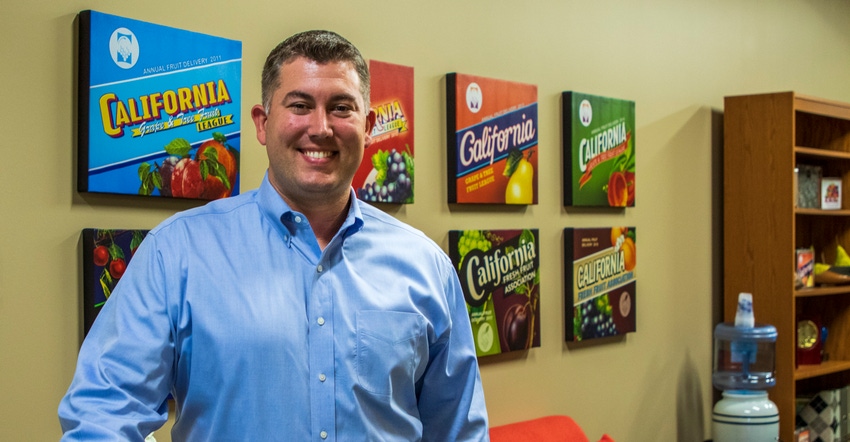
Times may have changed, but the issues faced by California fruit growers remain much the same as when they organized to move fruit by rail about a century ago. Critical issues facing fresh fruit growers still center on labor, water, and transportation, according to Ian LeMay, president of the California Fresh Fruit Association.
"Our organization started out as one that engaged the rail lines to negotiate shipping fruit from the West Coast to the East Coast," LeMay said. "That's why we were originally located in San Francisco, because the rail lines were located there."
The association changed its name in 2014, rebranding itself from what was previously the California Grape & Tree Fruit League. The association has seen a few name changes in the past 100 years ago. Name changes aside, the voluntary organization represents growers who produce about 85% of the fresh table grapes, tree fruit and berries in the state.
That membership represents 13 fresh fruit commodities grown from Lake and Butte counties in northern California, to the Coachella Valley region of Riverside County near the International Border.
When speaking publicly, LeMay can quickly recite the 13 commodities represented: peaches, plums, nectarines, apricots, table grapes, pears, apples, persimmons, cherries, figs, pomegranates, kiwi, and blueberries.
Current events
The international shipping constraints that started with the pandemic two years ago has significantly closed off export opportunities because of the perishable nature of the commodities represented. Once those supply chain issues are repaired and fresh commodities can again be shipped at a reasonable price to growers, LeMay says the lost opportunities in sales will likely require a significant effort to restore buyer confidence and relationships.
Labor remains a key component of discussions the organization has with regulators.
"We still depend on the human hand to pick, pack, and ship our products," he said.
California has the highest minimum wage for farmworkers in the U.S. at $15. Lawmakers changed the rules several years ago to transition farmworkers to a 40-hour work week and eliminate the ability for them to work more than eight hours a day without being paid overtime.
"It will change the way we do business because it increases our costs," he said. "The fallacy with AB 1066, which is what changed this back in 2016, was that agriculture was a 365-day a year job. That's not the case, especially with a perishable commodity. When that piece of fruit is ready for picking, we must get in the orchard or vineyard and pick that as quickly and efficiently as we can."
He continued: "That's why that 10-hour per day, 60-hour work week was so valuable and utilized. It wasn't because we were working 10 hours per day, 365 days per year. That fallacy was purported and represented by the proponents of that bill, and unfortunately the people that are going to really lose out are the employees."
An unintended cost of the current supply chain mess can be seen at the packer level. For shippers like Pandol Brothers in California, their bags for table grapes come from the Far East. The clamshells they pack product in are shipped from South America.
"They're not made here in the USA," said John Pandol of Pandol Brothers.
For that reason, packers have had to order more packing supplies than they would previously. This adds to the warehouse space needed to store these items, and the costs associated with buying larger supplies and carrying them.
"And the unfortunate part there too, is that you can try to build your inventory on those types of packing materials, but then your buyer or retail partner may come in and say, 'we're going to change that pack style' in the middle of the season or preseason, and that inventory does not hold value anymore," LeMay said. "It ultimately costs our industry and members millions of dollars because they have those clamshells or inventory that they cannot use."
Because of the shipping constraints related to U.S. agricultural goods, the U.S. Department of Agriculture has stepped up its food purchasing programs associated with fresh fruits, which LeMay says is welcome as those supplies can now only go to domestic markets. A larger number of grapes and plums have been moved into food banks and school lunch programs, which has helped the fresh fruit industry.
Lobbying efforts
LeMay was no stranger to ag industry lobbying efforts before coming to the CFFA in 2015. Prior to being hired to oversee the organization's membership and communications efforts, he was on staff with Rep. Jim Costa, D-CA, where he advised the congressman on agricultural issues. LeMay was promoted to CFFA president in 2019.
While working for Costa, LeMay said he likened the messages from farm groups to be forms of hyperbole. Consistent messages from agricultural organizations that the impacts of legislative and regulatory changes would cost agriculture much seemed far fetched to the young political aid.
"A lot of individuals who had been in the industry I found to be hyperbolic – you know, the sky was falling every day," he said. "I tried to position my thought process to look at the challenges and opportunities and try to find ways to find a pathway forward. Yet, where our industry finds ourselves in 2022, and as we head into this new season, I am finding it very hard not to be hyperbolic about where we find ourselves."
About the Author(s)
You May Also Like






